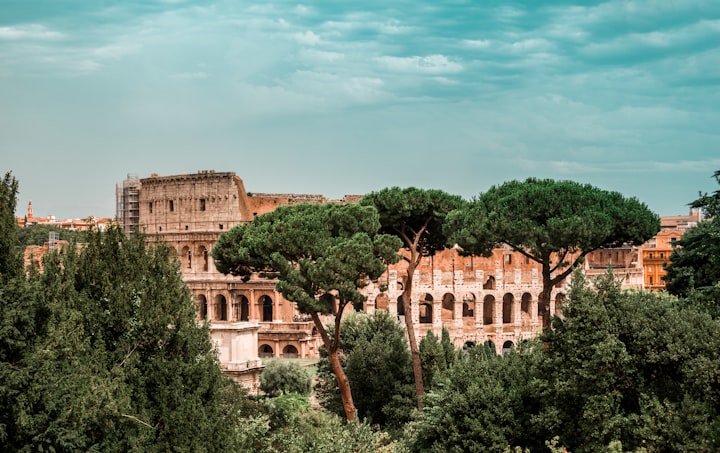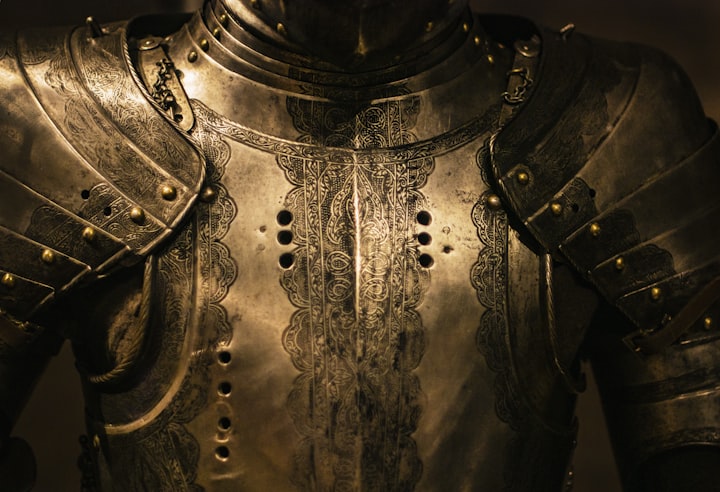
When Giafar the Grand vizier, his old and trusted friend, arrived before him, the Caliph Haroun-al-Raschid sat in his palace, wondering if there was anything left in the world that might potentially give him a few hours of entertainment. He bowed low and waited for his lord to speak, as was his job, but Haroun-al-Raschid simply turned to stare at him and sank back into his tired position.
Giafar had something important to say to the Caliph, and he wasn't about to be put off by quiet, so he began speaking with another low bow in front of the throne:
He addressed himself, "Commander of the Faithful. Permit me to remind your Highness of your plan to monitor how justice is administered and order is maintained across the city? Because today is the day you've set aside to accomplish your goal. Perhaps by doing this obligation, you will be able to find some relief from the melancholy to which, as I perceive it, you are prone."
"You are correct," the Caliph replied, "I had completely forgotten about it." Go change your coat, and I'll do the same."
They both re-entered the hall a few moments later, disguised as foreign traders, and exited through a secret entrance onto the open countryside. They then shifted their attention to the Euphrates, and after crossing the river in a small boat, walked through the town on the opposite bank, seeing nothing that required their intervention. The Caliph and his vizier had already crossed a bridge that went straight back to the palace, happy with the city's peace and order, when they were stopped by an elderly and blind man who begged for alms.
The Caliph handed him a piece of money and walked away, but the blind guy grabbed his hand and snatched it.
"Whoever you are, charitable person," he said, "give me another prayer." I implore you to strike me with one blow. I have richly merited it, as well as a more severe consequence."
"My good man, that which you want is impossible," the Caliph said gently, astonished by the suggestion. What good would my alms be if I mistreated you like this?" As he spoke, he began to ease the blind beggar's grip.
"My lord, excuse my boldness and persistence," the guy replied. "Return your money, or deal me the blow I'm looking for. And if you knew everything, you'd think the punishment isn't even a tenth of what I deserve."
The Caliph was moved by these comments, and possibly even more by the fact that he had other matters to attend to, so he succumbed and lightly smacked him on the shoulder. Then he continued on his way, with the blind man's blessing. "There must be something really weird to make that man act that way–I'd like to find out what the explanation is," he murmured to the vizier after they were out of earshot. Return to him, tell him who I am, and tell him to come to the palace at the hour of evening prayer tomorrow."
The following day, after evening prayer, the Caliph entered the hall, followed by the vizier, who brought with him the two individuals mentioned above, as well as a third with whom we have no dealings. They all bowed low in front of the throne, and the Caliph told them to stand up and ask the blind man his name.
"Your Highness, Baba-Abdalla," he said.
"Baba-Abdalla," the Caliph replied, "your style of asking alms yesterday sounded so unusual to me that I almost ordered you to stop generating such a big controversy right then and there." But I've sent you a message to find out why you made such an unusual pledge. I'll be able to help you once I know why. If you can continue to practice it, because I can't help but think it sets a really negative example for others. Tell me the complete truth and nothing but the truth."
I was born in Baghdad, Commander of the Faithful, and was orphaned when I was quite young, as both of my parents died within a few days of each other. I had inherited a tiny wealth from them, which I worked tirelessly to build up until I was the proud owner of eighty camels. I rented these to traveling merchants, whom I frequently accompanied on their numerous excursions, and they always profited handsomely.
I was returning from Balsora, where I had picked up a supply of commodities for India, and halted at noon in a lonely spot that promised plentiful pasture for my camels. I was sitting in the shade under a tree when a dervish approaching Balsora on foot sat down near me, and I inquired as to where he had come from and where he was headed. We quickly became friends, and after asking each other the standard questions, we produced the food we had brought with us and ate it to satisfy our appetite.
While we were eating, the dervish mentioned that a gem of of tremendous value was hidden just a short distance from where we were sitting. There was a treasure hidden so large that if I loaded my eighty camels until they couldn't carry any more, the hiding location would appear to be as full as if it had never been touched.
"Good dervish, I see plainly that the riches of this world are nothing to you, therefore of what use is the knowledge of this treasure to you?" I said as I wrapped my arms around the dervish's neck, almost beyond myself with excitement and greed. You could only carry a few of them if you were alone and on foot. But if you tell me where it is, I'll put it onto one of my eighty camels and present it to you as a gesture of my thanks."
The dervish could see what was going on in my head, but he didn't say anything about my suggestion.
"My brother," he said quietly, "you know as well as I do that you are acting in an unjust manner." Before I tell you the treasure's secret, you must pledge that after we've loaded the camels with everything they can carry, you'll give me half and let us go our separate ways. I believe you will agree that this is reasonable because if you present me with forty camels, I will provide you with the resources to purchase a thousand more."
Of course, I couldn't deny that what the dervish stated was absolutely rational, but the prospect of the dervish being as wealthy as I was too much for me to take. Still, there was no point in arguing about it; I had to accept his terms or bewail the loss of enormous money until the remainder of my days. So I gathered my camels and we embarked on our journey together, guided by the dervish. After a while of travelling, we arrived at what appeared to be a valley, but with such a tight entry that my camels could only pass through one at a time. Two mountains, whose sides were constructed of straight cliffs, encircled the small valley, or open space which no human could climb. The dervish came to a complete halt while we were exactly between these mountains.
"Make your camels lie down in this open spot so we can load them easily; then we'll go to the treasure," he added.
I did as I was told and returned to the dervish, who was trying to start a fire with some dry wood. He put a handful of fragrances on it as soon as it was lit, said a few phrases I didn't understand, and a thick column of smoke soared high into the air. He divided the smoke into two columns, and then I saw a rock that stood like a pillar between the two mountains slowly open, revealing a magnificent palace inside.
But, commander of the faithful, the desire of money had taken such hold of my heart that I couldn't even look at the treasures; instead, I swooped down on the first mound of gold within reach and began heaping it into a sack I'd carried with me.
The dervish got to work as well, but I soon observed that he was only interested in collecting costly stones, and I decided that I should follow his lead. After the camels had been laden with as much as they could carry, all that was left was to steal the treasure and go our own ways.
However, before this could be done, the dervish went up to a large, brilliantly chased golden vase and withdrew a tiny wooden box from it, which he hid in the bosom of his dress, claiming it contained a rare kind of ointment. Then he re-lit the fire, applied the perfume, and mumbled the mysterious spell, closing the rock.
The next step was to divide the camels and load the wealth upon them. My spirit was filled with the demon of envy. "With such wealth, what does a dervish want?" "I told myself." "He is the only one who knows the treasure's secret and can always get as much as he wants."
My brother," I cried as soon as I could, "nearly at the moment of our departure, a thought occurred to me that may be fresh to you." You work as a dervish and live a very quiet life, simply caring about doing good and unconcerned with the things of this world. You do not realise the load you place on yourself when you amass such vast money, aside from the fact that no one who has never been around camels from birth can ever handle the obstinate beasts. If you're clever, you won't take on more than thirty, and you'll find thirty to be enough trouble."
"You are correct," said the dervish, who had a good understanding of what I was saying. "I admit I hadn't given it much attention. Choose ten of your favourites and drive them ahead of you."
Ten of the top camels were chosen. I had gotten what I wanted, but the dervish had been so easy to deal with that I wished I had asked for ten more. I returned the stare. I called after him after he had just taken a few steps.
"My brother," I continued, "I am unwilling to split from you without pointing out something I believe you are unaware of: a great amount of camel-driving skill is required of anyone who wishes to keep a troop of thirty together." I believe you would be much happier if you put 10 more of them to your care because in my profession, it doesn't matter if I take two or a hundred."
The dervish made no difficulties this time, and I triumphantly drove off my ten camels, leaving him with only twenty for his share. I was sixty years old at the time, and you'd think I'd be content.
However, there is an adage that goes, "The more one has, the more one craves." That was the case with me. I couldn't sleep as long as one lone camel remained with the dervish, so I redoubled my prayers, embraces, and promises of eternal appreciation until the last twenty camels were in my hands.
About the Creator
Samiha
I'm a fan of poetry. I'm in love with words that are created through imagination.






Comments
There are no comments for this story
Be the first to respond and start the conversation.